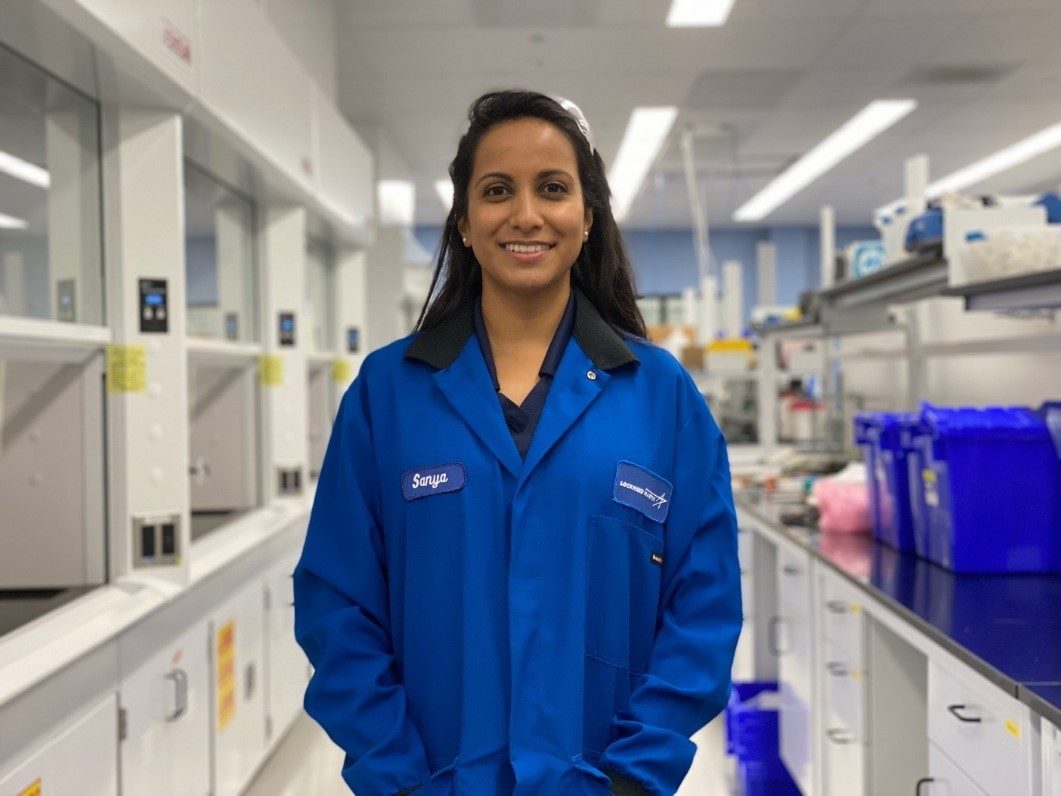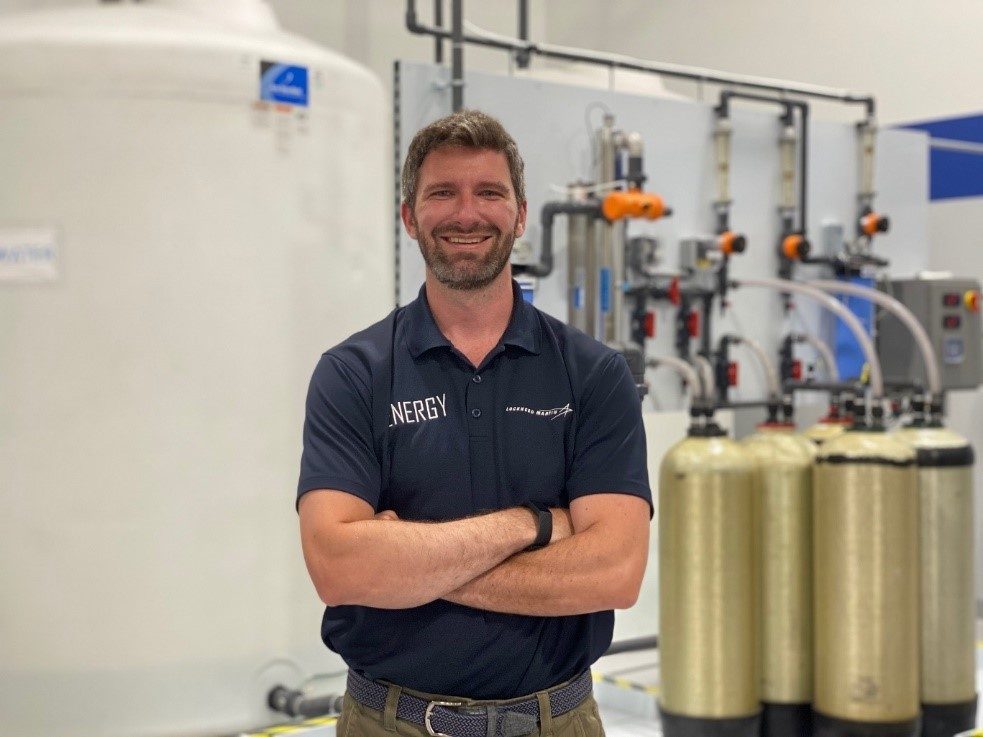Team of experts work on the science behind long-duration energy storage in a new, integrated facility
At Lockheed Martin, we’re working toward a future fueled by clean energy. Our solution? GridStar® Flow, an innovative redox flow battery.
Combining three separate operations into one, the GridStar Flow program recently moved to a cutting-edge facility in Andover, Massachusetts, where employees in labs, production and program management will collaborate to drive this new technology in long-duration energy storage.
The program is now completing initial product development by building an internal prototype of the first commercial system, known as Serial Number One (S/N01). This system will be built and tested in the coming months at the new Andover facility.
Sean Powers, a manufacturing engineer, and Sanya Ramjattan, a test engineer lead, know firsthand how a consolidated location benefits the team while developing advanced energy storage solutions. Below, they share what it’s like settling into the new Andover facility ahead of the launch of the first operational GridStar Flow system.

Q: What inspired you to get into energy? What’s it like to work in Energy stuff at Lockheed Martin?
Sanya Ramjattan: “I grew up in an oil-dependent economy in Trinidad and Tobago and always wanted to be a part of the change toward more sustainable energy infrastructure. My work with LM Energy certainly puts me and my teammates at the heart of that movement. We’re in a pretty unique position relative to other parts of Lockheed with some wildcard skillsets like electrochemists and chemical engineers. It’s exciting because we can adopt the robust engineering practices already established in other business areas to accelerate our product development.”
Sean Powers: “Reducing the earth’s dependency on fossil fuels is a real problem that needs to be solved. Long-duration energy storage is one of the keys to making renewable forms of energy like wind and solar more useful. The intermittent nature of wind and solar energy is one of their largest drawbacks and we’re looking to solve this problem with our flow battery – it’s not always sunny and it’s not always windy, but people use energy all the time. Working at LM means that we have a wide breadth of resources available. We’re able to leverage expert knowledge and experience in many different arenas to support the development and production of GridStar Flow.”
Q: At the Andover site, you’re both working toward the installation of GridStar Flow, Lockheed Martin’s energy storage solution. Why is this technology important to the future of the energy industry?
SR: “It’s one of our solutions to the energy storage deficit facing the renewables market today. GridStar Flow is [patented] technology based on coordination chemistry. The electrolytes that we use are earth-abundant and affordable. They provide long-duration storage with high efficiency. We are the only company that's developing this specific type of battery, so I think that really positions us well in the energy storage market.”
SP: “Flow batteries are an interesting technology. They're electrochemical cells, essentially, and what's cool about flow batteries is that you can customize the solution for whatever your specific need is for energy storage. The chemistry that we use is cost-competitive and safer than the other flow batteries that currently exist in the world right now. If we ever want to pivot away from dependence or reliance on fossil fuels and have a greater focus on renewable, green sources of energy, this type of technology will be critical to that.”
Q: How does moving into the Andover site facilitate next steps for the launch of GridStar Flow S/N01?
SP: “It allows us the necessary room. Our power modules are thousands of pounds, and you need space to be able to work on, integrate and diagnose any problems you might have with them. You need space for something of this size, without a doubt, and the new facility provides that for us. Just today, we were integrating our battery packs into one of the first power modules for S/N01. This integration is one of our final steps in the development process before GridStar Flow goes to market, so it's an essential piece of the program. We'll get a lot of good data and information from S/N01, and it being so close to the program is extremely helpful.”
SR: “I think it’s a great milestone in bringing us closer to deployment. Being in the new facility really makes it real for us. It's kind of this representation of how far we've come from our days of benchtop experiments to delivering these repeatable results on large scale flow battery systems. We used to have small, handheld batteries that couldn't deliver much storage, but now we're working with these larger systems and the new facility represents that transformation. For S/N01, I worked on delivering one of the subsystems. It has been highly rewarding to see a project that I joined at the beginning grow where it is today as part of S/N01.”

Q: What are some benefits you see from changing locations and putting manufacturing, testing and production all in one place?
SR: “It feels like a testament to the interdisciplinary nature of our program as well as the fine group of people who are working toward our goals. We have a pretty complex technology requiring scientists, test engineers, electrical engineers and designers – all of them functioning alongside one another on independent portions of the system. But to be successful, it's important that we can bring those independent contributions together to create something that's greater than the sum of its parts. For me, being in that new space and seeing the new facility really brings it into perspective.”
SP: “We’ll be able to improve communication across departments. Now a team member from manufacturing or operations can interact with someone from another department face-to-face – for now, of course, with social distancing precautions like wearing masks and meeting in open areas. This makes our business processes more efficient and enhances our cross-functional dynamics. This will truly benefit the program and I’m excited to be a part of it.”
Q: How is your role better served in the new facility?
SP: “I'm in the manufacturing space, which is adjacent to the new office and lab. We call that [space] the New Product Introduction area, or the NPI. This is where we've been manufacturing battery stacks and where we are integrating them into the power module. Right now, we're working hard, preparing and setting up our manufacturing line.”
SR: “I work in the development labs. Previously we were at different sites; now we are consolidating into one integrated team that better serves the needs of the program. The idea here is really to leverage all our learnings and discoveries across the test fleet to drive and accelerate our product development.”
For more information about GridStar Flow, visit this webpage.




